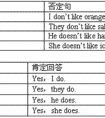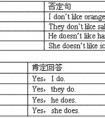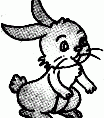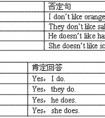根据要求完成句子。1. DidyouplayfootballwithZhangPeng ?(作否定回答)2. 我上周末看大象了。(译为英语)3. Isawacamera.(就划线部分提问) 4.Iwenttherebytrain.(就划-六年级英语
结构句型:
1.一般句子
I watched TV last night.
2.一般疑问句
Did you watch TV last night?
3.there be 句型
There was an apple on the table last night.
Was there an apple on the table last night
一般过去时并不难,过去动作、状态记心间。
动词要用过去式,时间状语句末站。
否定句很简单,didn't 站在动原前,其它部分不要变。
一般疑问句也好变,did放在句子前,主语、动原、其它部分依次站。
特殊疑问句也简单,疑问词加一般疑问句记心间。
最后一条请注意,动词过去式要牢记!
|
词 |
构成 |
举例 | |
|
一般情况 |
词尾+ed |
动词原形 |
过去式和过去分词 |
|
look |
looked | ||
|
以不发音字母e结尾 |
词尾+d |
like |
liked |
|
以“辅以字母+y”结尾 |
变y为i,再加ed |
fly |
flied |
|
以重读闭音节结尾,且末尾只有一个辅音字母 |
双写词尾+ed |
stop |
stopped |
have---had are---were get---got say---said feel---felt do/does---did is---was go---went drink--drank eat--ate bring----brought think----thought
buy----bought catch---- caught teach ---- taught sit----sat wear----wore cut----cut sweep----swept sleep——slept become----became
考点名称:特殊疑问句
- 特殊疑问句:
以特殊疑问词开头,对句中某一成分提问的句子叫特殊疑问句。
常用的疑问词有:what、who、whose、which、when、where、how、why等。
特殊疑问句往往是就其中的某一成分,进行提问,而且根据情况直接回答,不能用yes或no简单回答。
常见的疑问代词有who, whose, which, what;疑问副词有when, where, why, how。
例:What do you do on Sunday? 你周日的时候干什么?
Which class are you in? 你在哪个班?
Where does Mr. Li live? 李先生住在哪?
Why are you late? 你为什么迟到? 特殊疑问句的构成:
一、 特殊的疑问词。
特殊疑问句要由疑问代词或疑问副词开头,询问的内容不同, 使用的疑问词也不同。
我们学过的疑问词有:
what(询问事物), how much(询问价格),what time (询问时间,尤其是点钟), what kind of(询问种类),why(询问原因),who(询问人), where(询问地点) 等等。如:
—What is this? 这是什么?
—It's a key. 这是一把钥匙。
—How much is it? 这个多少钱?
—It's twenty dollars. 二十美元。
—What kind of movies do you like? 你喜欢哪一类型的电影?
—I like action movies. 我喜欢动作片。
二、特殊的语序。
特殊疑问句由疑问词开头,其构成是“疑问词 + 一般疑问句”。如:
What time is it? 现在几点钟?
Who is your teacher? 谁是你的老师?
三、特殊的答语。
特殊疑问句不能用yes, no来回答,而应根据它所询问的内容直接做出回答才行。如:
— What time is it, please? 请问几点了?
— It's 7:30. 七点半了。
— Where are they? 他们在哪儿?
—They're in the playground. 他们在操场上。
—What's your favorite subject? 你最喜爱的科目是什么?
—English. 英语。
四、 特殊的语调。
一般情况下,特殊疑问句要用降调(↘)来读。如:
Who's ↘that?
How old is↘Jack?特殊疑问句有两种语序:
1.如疑问词作主语或主语的定语,即对主语或主语的定语提问,其语序是陈述句的语序:
Who is singing in the room﹖
whose bike is broken﹖
2.如疑问词作其他成分,即对其他成分提问,其语序是:
特殊疑问词+一般疑问句【特殊疑问词+be/助动词/情态动词+主语+谓语】
What does she like?
What class are you in﹖
Where are you from﹖
What time does he get up every morning﹖
How do you know﹖- 就划线部分提问的基本方法:
小学对特殊疑问句的考查主要采取对划线句子提问的方式,那么在句型转换就划线部分提问的基本方法是:
先根据划线部分词语的意思和句法功能确定用什么疑问词;
然后将原句变为一般疑问句跟在疑问词的后面即可(注意去掉划线部分)。
基本构成:疑问词+一般疑问句
A、对“物”划线用What。
This is an orange. → What is this?
We can see a cat under the desk. → What can you see under the desk?
B、对“地点”划线用Where,如果“地点”作定语时,用Which后跟被修饰的那个名词。
He is under the tree. → Where is he?
Jenny is in the classroom. → Where is Jenny?
C、对“年龄”划线用How old。
Miss Li is twenty-three. → How old is Miss Li?
My sister is five years old. → How old is your sister?
D、对“颜色”划线,用What colour。
Her sweater is red. → What colour is her sweater?
E、对“可数名词的数量”划线用How many +复数名词。
She has one red coat. → How many red coats does she have?
I have six books. → How many books do you have?
F、对“不可数名词的数量”划线用How much+不可数名词。
I want to buy three kilos of meat. →How much meat do you want to buy?
G、对“职业”划线用What。
She is a driver. → What is she?
My father is a farmer. → What is your father?
H、对“星期几”划线用What day。
It's Sunday today. → What day is it today?
I、对“时间”划线用What time。
We go to school at seven in the morning. → What time do you go to school in the morning?
It is five o’clock now. → What time is it?
考点名称:翻译能力
小学翻译能力的体现主要是简单句子,词组和固定搭配的中英文的互译。中文句子翻译成英文,英语词组的填空,和基本的语句中英翻译。
- 翻译题注意事项:
一般说来,句子翻译都有个明显的考查意图,要么是考查某个词的用法或习惯表达,要么是考查某个句型的结构或搭配,或者是考查某条语法规则的具体运用,等等。
1、要注意英语的习惯表达以及英汉两种语言的不同之处。
由于历史、文化等方面的原因,英汉两种语言在用词选句等方面有许多不同之处,这一点一定要引起足够的重视,千万不要用汉语的习惯硬套英语句型。
2、不要逐字翻译。不少同学在做翻译练习中往往有逐字翻译的习惯。
总之,在做句子翻译题时,要注意单词的词形变化,如名词的单复数;
动词的时态、语态及非谓语动词;
形容词、副词的比较级、最高级等。
除了掌握正确的解题思路和技巧外,重要的是平时的积累,考试时的认真、细心、全盘考虑。 句子翻译的常用技巧:<?xml:namespace prefix = "o" ns = "urn:schemas-microsoft-com:office:office" />
- 最新内容
- 相关内容
- 网友推荐
- 图文推荐
| [家长教育] 孩子为什么会和父母感情疏离? (2019-07-14) |
| [教师分享] 给远方姐姐的一封信 (2018-11-07) |
| [教师分享] 伸缩门 (2018-11-07) |
| [教师分享] 回家乡 (2018-11-07) |
| [教师分享] 是风味也是人间 (2018-11-07) |
| [教师分享] 一句格言的启示 (2018-11-07) |
| [教师分享] 无规矩不成方圆 (2018-11-07) |
| [教师分享] 第十届全国教育名家论坛有感(二) (2018-11-07) |
| [教师分享] 贪玩的小狗 (2018-11-07) |
| [教师分享] 未命名文章 (2018-11-07) |





![____ it got four wheels?[ ]A. Have B. There C. Has-五年级英语](http://www.00-edu.com/d/file/ks/4/1/65/2019-08-31/small2ca0aeba76320ba6f81e40fe83a0e8111567199443.png)
